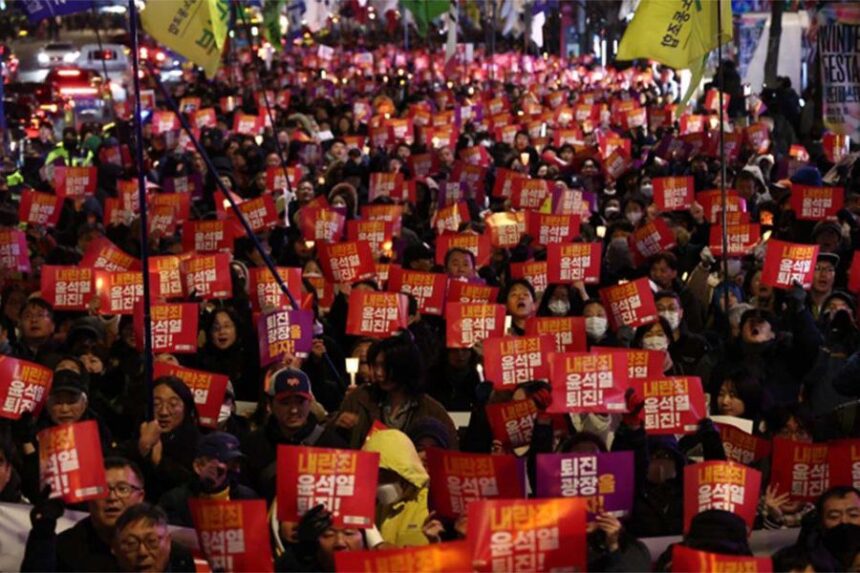December 11, 2024
chicago ——Yin Xiyeol’s latest political strategy undoubtedly did not unfold as he expected. South Korea’s scandal-plagued president suddenly declared martial law on December 3 and was forced to lift it within hours in the face of public protests and legislative opposition. He now faces an impeachment motion from the opposition Democratic Party, which denounced his “acts of insurrection”.
As of this writing, the opposition is eight votes short of the votes needed to oust Yoon Eun-hye. But given the clever design of South Korea’s 1987 constitution and the country’s recent experience with impeachment, the opposition has an advantage and is on solid legal footing. Yin’s ouster will serve as a global example, in stark contrast to the United States, of how democracies can and should respond to those who abuse the privileges of office.
South Korea’s president could be impeached for “violating the Constitution or other laws in the performance of official duties.” While a simple majority of the National Assembly can introduce an impeachment bill, it must be approved by a two-thirds absolute majority. As in the United States, the Constitution limits the effect of impeachment to removal from office and explicitly leaves open the possibility of criminal prosecution. But unlike the United States, South Korea’s president facing impeachment immediately hands over his responsibilities to the prime minister. In another departure from the American model, the impeachment motion is then submitted to the Constitutional Court for final approval.
This design has led to two successful impeachments in the past two decades. President Roh Moo-hyun was impeached in 2004, but the court found that the charges against him were insufficient to justify his dismissal. Roh went on to serve out his term but later committed suicide while facing corruption charges. Subsequently, in December 2016, President Park Geun-hye was impeached, and this time the Constitutional Court confirmed the decision. In 2018, Park Geun-hye was sentenced to prison on charges of criminal corruption and abuse of power (she was released in 2021).
South Korea’s impeachment experience is rare. A recent study I co-authored showed that between 1990 and 2017, there were only 10 successful impeachments worldwide. While some may consider removing elected leaders undemocratic, South Korea’s experience shows that impeachment can be an effective tool in defending democracy.
Today, South Korean lawmakers know they will break no new ground if they impeach Yoon. Unlike the impeachment proceedings in the United States, North Korea’s impeachment proceedings remain a credible, serious part of the country’s democratic politics. Lawmakers can be reassured by the fact that past decisions to remove presidents were not viewed solely as partisanship. Because the vote in Park Geun-hye’s case was bipartisan, members of Yoon’s People Power Party could not seek refuge simply by voting along party lines. Precedent requires them to take their constitutional responsibilities seriously, just as others before them have done.
The Constitutional Court’s certification of their decisions effectively checks the legality of their work and also plays an important role in protecting lawmakers from accusations of partisan misconduct. In 2004, the court made clear that while the National Assembly could play a political and fact-finding role, judges would ultimately decide whether the facts presented met the constitutional threshold for removal. Nor can legislators be accused of behaving undemocratically. After all, a successful impeachment vote would inevitably lead to new elections. Far from overthrowing the people, they prevented the people’s trust from being abused.
Final review by the Constitutional Court and the quick triggering of new elections are both missing from the American system, to its apparent detriment. Due to the wise choices of the drafters of South Korea’s constitution, impeachment served as a “hard reset” of the democratic system. When evil incumbents show their true colors, they can be swept out before the public loses faith in the system. The court’s ruling on the Roh Moo-hyun case in 2004 clearly illustrates this point. The judges held that impeachment should only occur in cases of serious violations of the law and when the president’s removal is “necessary to restore the damaged constitutional order.”
Given this criterion, there is good reason to conclude that Yoon’s behavior was even more up to par than Park’s. Under the 1987 Constitution, the president can only declare martial law “in response to military needs or to mobilize the military to maintain public safety and order in times of war, armed conflict or similar national emergencies.” Not only did Yin’s decision fall far short of that standard, it fell far below it. It laughs at it.
In his speech declaring martial law, Yoon did not even mention any “military necessity” or credible threat to “public order.” Instead, he criticized lawmakers for their financial decisions (which allegedly turned the country into a “drug paradise”), investigations into his scandals, and unwarranted criticism of “communist forces in North Korea and the threat from the Democratic People’s Republic of Korea.” The confirmed claims made some outrageous claims. […] Shameless pro-North Korea and anti-national forces. Mr. Yoon’s erratic behavior and blatant disregard for the facts fell far short of the constitutional standards for imposing martial law and exposed a reckless disregard for South Korea’s democratic institutions.
At a time when leaders of other countries whose democratic backsliding seems to go unpunished, South Korea’s latest impeachment reminds us that democracy, once established, can easily be lost through negligence or venality. The authority of the president must not be confused with the naked exercise of power by the man who once won the election.
The author is a law professor at the University of Chicago and the author of “The Collapse of Constitutional Remedies.”





